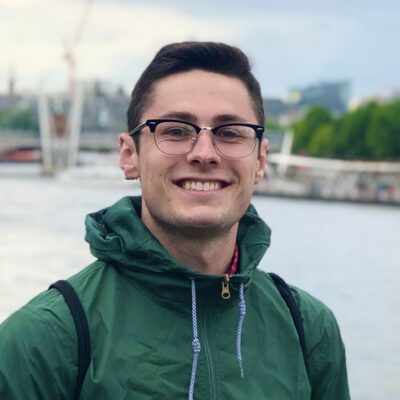Student Spotlight: Rick Zirkel

January 6, 2025
Rick Zirkel is a doctoral candidate in biomedical engineering from Blue Point, New York. He earned his bachelor’s degree in biomedical engineering at SUNY at Buffalo and now studies how psychedelic drugs affect neurovascular coupling under the guidance of Chris Schaffer at Cornell.
What is your area of research and why is it important?
I study how psychedelic drugs, such as psilocybin (magic mushrooms) and LSD, affect the relationship between brain activity and blood flow—a process called neurovascular coupling. This relationship is critical for interpreting fMRI studies, where blood flow changes are used as a proxy for brain activity. Psychedelic drugs are gaining attention for their therapeutic potential in treating mental health disorders like depression and anxiety, but they may directly influence blood vessels, altering neurovascular coupling. My research investigates these effects to improve our understanding of how these drugs work and ensure accurate interpretation of fMRI data in clinical trials.
What are the larger implications of this research?
My research has implications for both neuroscience and mental health treatment. Psychedelic drugs show promise in treating conditions like depression, anxiety, and addiction, but fully understanding their effects requires accurate interpretation of brain imaging data. By clarifying how these drugs alter the relationship between brain activity and blood flow, my work can improve the design and analysis of clinical trials. This ensures that researchers and clinicians can better understand the therapeutic mechanisms of psychedelics, ultimately paving the way for safer, more effective treatments and potentially transforming how we approach mental health care globally.
What have you gained by participating in the NextGen Professors Program?
The NextGen Professors Program has provided me with valuable insights into navigating the transition from Ph.D. student to postdoctoral researcher and, ultimately, to a faculty career. It has helped me identify my strengths and areas for growth, and the discussions with peers and mentors have been instrumental in developing strategies to address challenges. Hearing from others in similar fields has offered reassurance and perspective, especially regarding shared struggles like managing workloads and imposter syndrome. This supportive environment has motivated me to set concrete goals and stay accountable in preparing for the next stage of my career.
How has this program been helpful in working toward your professional goals?
This program has been an essential resource as I work toward my goal of becoming a faculty member. It has provided structured time and guidance to reflect on my professional aspirations, refine my application materials, and prepare for postdoc interviews. Networking with other members of the cohort has offered practical advice on balancing competing demands, such as finishing my Ph.D., publishing papers, and planning for the future. The program has also given me the tools to develop a clearer, more confident path toward achieving my career goals in academia.
What are your hobbies or interests outside of your research or scholarship?
I am very active and like to participate in any sports I can, as well as working out doing CrossFit or just at the gym. I play a lot of soccer whether it’s on an organized team through Cornell intramurals or local Ithaca leagues or just pickup with friends. I also play on volleyball and kickball teams when they are in season. Off the field I enjoy playing video games with friends, watching movies, skiing (at least I did when we used to have snow), and playing guitar.
Why did you choose Cornell to pursue your degree?
Choosing Cornell for my graduate program was a very easy decision for me. During my undergrad I established a relationship with the biomedical engineering department here and spent a summer participating in a research experiences for undergraduates (REU) program in neurobiology and behavior during which I really enjoyed both Cornell and living in Ithaca. I was also very interested in the work being done in the Schaffer-Nishimura Lab (my current lab). Finally, location-wise it just made sense, as my parents are on Long Island, and my brothers were still finishing up their undergrad and dental programs at Buffalo, and Ithaca is a perfect middle place between the two.
